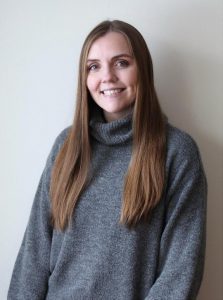
We interviewed psychological foundations of education MA student Shelby Weisen about her experiences as a student in the Department of Educational Psychology and her aspirations for the future.
What are your research interests?
My research focuses on the intersection between social and educational elements of psychology with specific interest in collaborative learning, academic feedback, and intercultural competence in undergraduate classrooms. As someone who hopes to be a professor someday, I aim to complete research that will help my future students.
How did your path lead to the Department of Educational Psychology and your particular major?
After graduating with my B.A. in psychology, I immediately applied to social psychology Ph.D. programs across the country, with hopes of ultimately ending up at the U of M. At the same time, my husband was offered a Fulbright scholarship to teach in Germany for a year. I decided to assist him in this endeavor and come back to Minnesota with a fresh perspective. While reapplying to programs, I managed a mental health clinic and was able to see, first-hand, the work of individuals with various psychology-based degrees. This experience gave me a deeper drive to continue my education and find an intersection between my research and my future occupation. The Department of Educational Psychology has programming that allows me to do just that!
What surprised you along the way?
I always aspired to continue my education in a social psychology graduate program. However, I was surprised to find that there was an even better fit for me in the Department of Educational Psychology. Through the Psychological Foundations – Social Track, I have the perfect opportunity to intertwine my passion for social psychology and my drive to provide a better school experience for future students.
What is something you’ve most enjoyed about your experience?
I’m honored to work alongside some of the brightest minds in our community. I’m inspired by my instructors and colleagues daily, and I am very proud of the work that we are doing to better the current education system.
What is most exciting about your work?
It’s extremely exciting to see the breadth of research going on in our department and to witness the positive changes that come from it. Furthermore, as a teaching assistant, I am proud to see my students reach their educational goals.
How would you describe the student experience, and what does that mean to you?
In any institution, or program, the student experience can vary significantly from one individual to the next. For myself, I put a heavy emphasis on engagement and collaboration, a sense of belonging, and academic excellence. I know that our program works diligently to create a positive student experience for all. Still, more work needs to be done across all institutions to improve the student experience of BIPOC and LGBTQ+ students.
What has been most challenging?
A big challenge for us this year was the pandemic and the rapid switch to online instruction. As a teaching assistant, I was impacted as both a student and an instructor. It was a tough time for everyone. Luckily, the connections and resources within our college allowed us to continue offering quality instruction to our students. The Center for Educational Innovation (CEI) and those in the Learning Technologies program were there to mentor us when we needed them most. I also applaud my instructors for having frequent check-ins with their students, giving us opportunities to voice any concerns or suggestions.
How have your professors helped you along the way?
The professors and instructors that I have worked with have made all the difference in my graduate education. They care about me as an individual and as a student, challenging me and supporting me through each endeavor.
What would you like prospective students to know?
It’s important to find your fit within a program. This requires research before your applications are submitted. I picked this program because I was excited about the research that our labs were completing, and I felt like I could add to and expand upon it. Still, when I arrived as a prospective student, I was more impressed with the people I met. The sense of community, coupled with the academic rigor, sealed the deal for me!
How has your cohort helped you along the way?
My cohort is very close. We motivate each other, support each other, and keep each other accountable. Even during the pandemic and throughout summer, we still have Zoom lunches to keep in touch. Other cohorts have also welcomed us to their events like burrito night, trivia events, book clubs, etc. There is always something going on in our program!
What are you looking forward to with graduation?
I look forward to using what I’ve learned to make a positive change in our education system.
How do you plan to use what you are learning/your degree?
I hope to become a professor of psychology someday. Teaching brings me joy, and research guides me in becoming a better teacher. My ultimate goal is to teach undergraduate students and create a research lab that allows them to get involved in research earlier in their careers.
Any additional information you would like people to know?
I grew up in small-town central Minnesota. So, I was understandably nervous to live in a big city for the first time. However, from the moment I got here, I was consistently in awe of the beauty of Minneapolis. It’s truly magnificent to swim in the lakes and see large skylines in the distance. The food is marvelous, and the arts/music are unparalleled. Living here, you’re always in range of a new adventure.



